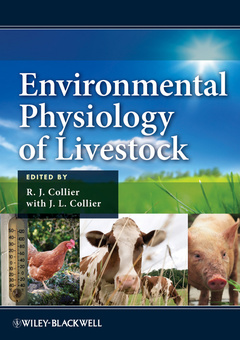Environmental Physiology of Livestock
Coordonnateurs : Collier R. J., Collier J. L.

Environmental Physiology of Livestock begins with a survey of current heat indexing tools, highlighting recent discoveries in animal physiology, changes in productivity levels, and new technologies available to better estimate stress response. Using this synopsis as a point of orientation, later chapters hone in on major effects of heat stress, including changing metabolic pathways and nutrient requirements, endocrine regulation of acclimation to environmental stress, and reduced reproductive performance. The text concludes with a thorough discussion of environmental effects on gene expressions, providing important insight for future breeding practices.
Environmental Physiology of Livestock is a globally contributed volume and a key resource for animal science researchers, geneticists, and breeders.
Contributors ix
Foreword xi
1 From Heat Tolerance to Heat Stress Relief: An Evolution of Notions in Animal Farming 1
Amiel Berman
2 Physiological Basics of Temperature Regulation in Domestic Animals 17
Donald E. Spiers
3 Heat Stress and Evaporative Cooling 35
Kifle G. Gebremedhin
4 Regulation of Acclimation to Environmental Stress 49
Kajal Sankar Roy and Robert J. Collier
5 Environment and Animal Well-Being 65
S. D. Eicher
6 Effects of Environment on Metabolism 81
Lance Baumgard and Robert P. Rhoads
7 Impact of Hot Environment on Nutrient Requirements 101
Umberto Bernabucci
8 Effects of Environment on Animal Health: Mechanisms and Regulatory Inputs 129
Ted H. Elsasser, Cong-Jun Li, Jessica Shaffer, and Robert J. Collier
9 Effect of Environment on Immune Functions 165
Nicola Lacetera
10 Strategies for Improvement of Thermal and Reproductive Responses under Heat Stress 181
David Wolfenson and William W. Thatcher
11 Prospects for Improving Fertility during Heat Stress by Increasing Embryonic Resistance to Elevated Temperature 199
Peter J. Hansen
12 Environmental Heat Stress Impairs Placental Function, Fetal Growth and Development, and Postnatal Performance in Livestock 209
Dustin T. Yates, Xiaochuan Chen, and Sean W. Limesand
13 Effects of Photoperiod on Domestic Animals 229
Geoffrey E. Dahl and Izabella M. Thompson
14 Rethinking Heat Index Tools for Livestock 243
J. B. Gaughan, T. L. Mader, and K. G. Gebremedhin
15 Strategies to Reduce the Impact of Heat and Cold Stress in Dairy Cattle Facilities 267
John R. Smith and J. P. Harner, III
16 Genotype by Environment Interactions in Commercial Populations 289
Ignacy Misztal and Peter Lovendahl
17 Responses of Poultry to Environmental Challenges 309
J. Brake and S. Yahav
Index 337
Robert J. Collier is Professor and Head of the Department of Animal Science at the University of Arizona. His primary area of research is studying environmental effects on gene expression in domestic animals, utilizing both practical management models as well as controlled environmental facilities to modify environments around animals.
Date de parution : 02-2012
Ouvrage de 368 p.
17.8x25.2 cm
Thème d’Environmental Physiology of Livestock :
Mots-clés :
amiel; evolution; notions; berman; animal; heat; contributors; tolerance; stress; foreword; ix; kifle; gebremedhin; kajal; environmental; acclimation; sankar; robert; regulation; metabolism; environment; eicher



